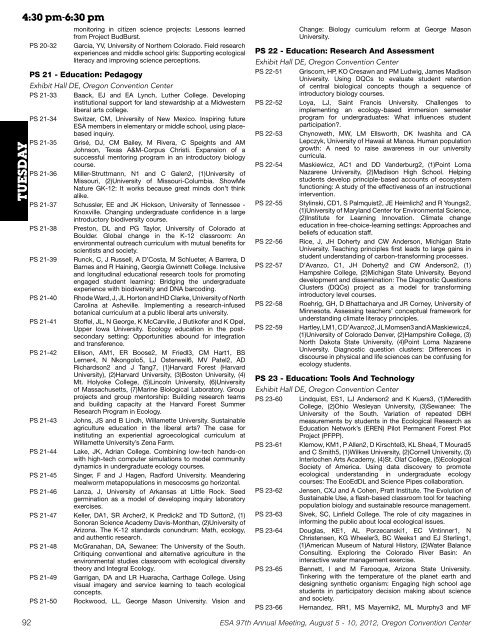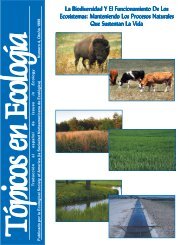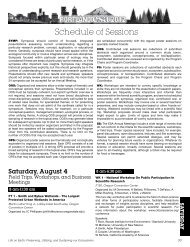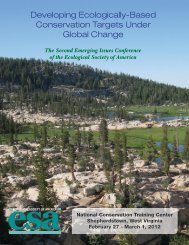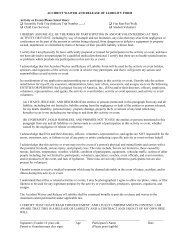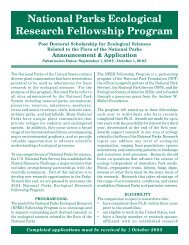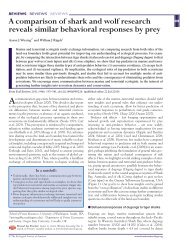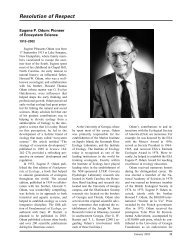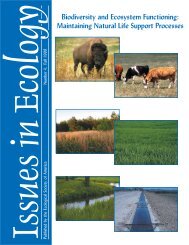Printed Program (PDF) - Ecological Society of America
Printed Program (PDF) - Ecological Society of America
Printed Program (PDF) - Ecological Society of America
You also want an ePaper? Increase the reach of your titles
YUMPU automatically turns print PDFs into web optimized ePapers that Google loves.
TUESDAY<br />
4:30 pm-6:30 pm<br />
monitoring in citizen science projects: Lessons learned<br />
from Project BudBurst.<br />
PS 20-32 Garcia, YV, University <strong>of</strong> Northern Colorado. Field research<br />
experiences and middle school girls: Supporting ecological<br />
literacy and improving science perceptions.<br />
PS 21 - Education: Pedagogy<br />
Exhibit Hall DE, Oregon Convention Center<br />
PS 21-33 Baack, EJ and EA Lynch, Luther College. Developing<br />
institutional support for land stewardship at a Midwestern<br />
liberal arts college.<br />
PS 21-34 Switzer, CM, University <strong>of</strong> New Mexico. Inspiring future<br />
ESA members in elementary or middle school, using placebased<br />
inquiry.<br />
PS 21-35 Grisé, DJ, CM Bailey, M Rivera, C Speights and AM<br />
Johnson, Texas A&M-Corpus Christi. Expansion <strong>of</strong> a<br />
successful mentoring program in an introductory biology<br />
course.<br />
PS 21-36 Miller-Struttmann, N1 and C Galen2, (1)University <strong>of</strong><br />
Missouri, (2)University <strong>of</strong> Missouri-Columbia. ShowMe<br />
Nature GK-12: It works because great minds don’t think<br />
alike.<br />
PS 21-37 Schussler, EE and JK Hickson, University <strong>of</strong> Tennessee -<br />
Knoxville. Changing undergraduate confidence in a large<br />
introductory biodiversity course.<br />
PS 21-38 Preston, DL and PG Taylor, University <strong>of</strong> Colorado at<br />
Boulder. Global change in the K-12 classroom: An<br />
environmental outreach curriculum with mutual benefits for<br />
scientists and society.<br />
PS 21-39 Runck, C, J Russell, A D’Costa, M Schlueter, A Barrera, D<br />
Barnes and R Haining, Georgia Gwinnett College. Inclusive<br />
and longitudinal educational research tools for promoting<br />
engaged student learning: Bridging the undergraduate<br />
experience with biodiversity and DNA barcoding.<br />
PS 21-40 Rhode Ward, J, JL Horton and HD Clarke, University <strong>of</strong> North<br />
Carolina at Asheville. Implementing a research-infused<br />
botanical curriculum at a public liberal arts university.<br />
PS 21-41 St<strong>of</strong>fel, JL, N George, K McCarville, J Butik<strong>of</strong>er and K Opel,<br />
Upper Iowa University. Ecology education in the postsecondary<br />
setting: Opportunities abound for integration<br />
and transference.<br />
PS 21-42 Ellison, AM1, ER Boose2, M Friedl3, CM Hart1, BS<br />
Lerner4, N Nkongolo5, LJ Osterweil6, MV Patel2, AD<br />
Richardson2 and J Tang7, (1)Harvard Forest (Harvard<br />
University), (2)Harvard University, (3)Boston University, (4)<br />
Mt. Holyoke College, (5)Lincoln University, (6)University<br />
<strong>of</strong> Massachusetts, (7)Marine Biological Laboratory. Group<br />
projects and group mentorship: Building research teams<br />
and building capacity at the Harvard Forest Summer<br />
Research <strong>Program</strong> in Ecology.<br />
PS 21-43 Johns, JS and B Lindh, Willamette University. Sustainable<br />
agriculture education in the liberal arts? The case for<br />
instituting an experiential agroecological curriculum at<br />
Willamette University’s Zena Farm.<br />
PS 21-44 Lake, JK, Adrian College. Combining low-tech hands-on<br />
with high-tech computer simulations to model community<br />
dynamics in undergraduate ecology courses.<br />
PS 21-45 Singer, F and J Hagen, Radford University. Meandering<br />
mealworm metapopulations in mesocosms go horizontal.<br />
PS 21-46 Lanza, J, University <strong>of</strong> Arkansas at Little Rock. Seed<br />
germination as a model <strong>of</strong> developing inquiry laboratory<br />
exercises.<br />
PS 21-47 Keller, DA1, SR Archer2, K Predick2 and TD Sutton2, (1)<br />
Sonoran Science Academy Davis-Monthan, (2)University <strong>of</strong><br />
Arizona. The K-12 standards conundrum: Math, ecology,<br />
and authentic research.<br />
PS 21-48 McGranahan, DA, Sewanee: The University <strong>of</strong> the South.<br />
Critiquing conventional and alternative agriculture in the<br />
environmental studies classroom with ecological diversity<br />
theory and Integral Ecology.<br />
PS 21-49 Garrigan, DA and LR Huaracha, Carthage College. Using<br />
visual imagery and service learning to teach ecological<br />
concepts.<br />
PS 21-50 Rockwood, LL, George Mason University. Vision and<br />
Change: Biology curriculum reform at George Mason<br />
University.<br />
PS 22 - Education: Research And Assessment<br />
Exhibit Hall DE, Oregon Convention Center<br />
PS 22-51 Griscom, HP, KO Cresawn and PM Ludwig, James Madison<br />
University. Using DQCs to evaluate student retention<br />
<strong>of</strong> central biological concepts though a sequence <strong>of</strong><br />
introductory biology courses.<br />
PS 22-52 Loya, LJ, Saint Francis University. Challenges to<br />
implementing an ecology-based immersion semester<br />
program for undergraduates: What influences student<br />
participation?.<br />
PS 22-53 Chynoweth, MW, LM Ellsworth, DK Iwashita and CA<br />
Lepczyk, University <strong>of</strong> Hawaii at Manoa. Human population<br />
growth: A need to raise awareness in our university<br />
curricula.<br />
PS 22-54 Maskiewicz, AC1 and DD Vanderburg2, (1)Point Loma<br />
Nazarene University, (2)Madison High School. Helping<br />
students develop principle-based accounts <strong>of</strong> ecosystem<br />
functioning: A study <strong>of</strong> the effectiveness <strong>of</strong> an instructional<br />
intervention.<br />
PS 22-55 Stylinski, CD1, S Palmquist2, JE Heimlich2 and R Youngs2,<br />
(1)University <strong>of</strong> Maryland Center for Environmental Science,<br />
(2)Institute for Learning Innovation. Climate change<br />
education in free-choice-learning settings: Approaches and<br />
beliefs <strong>of</strong> education staff.<br />
PS 22-56 Rice, J, JH Doherty and CW Anderson, Michigan State<br />
University. Teaching principles first leads to large gains in<br />
student understanding <strong>of</strong> carbon-transforming processes.<br />
PS 22-57 D’Avanzo, C1, JH Doherty2 and CW Anderson2, (1)<br />
Hampshire College, (2)Michigan State University. Beyond<br />
development and dissemination: The Diagnostic Questions<br />
Clusters (DQCs) project as a model for transforming<br />
introductory level courses.<br />
PS 22-58 Roehrig, GH, D Bhattacharya and JR Corney, University <strong>of</strong><br />
Minnesota. Assessing teachers’ conceptual framework for<br />
understanding climate literacy principles.<br />
PS 22-59 Hartley, LM1, C D’Avanzo2, JL Momsen3 and A Maskiewicz4,<br />
(1)University <strong>of</strong> Colorado Denver, (2)Hampshire College, (3)<br />
North Dakota State University, (4)Point Loma Nazarene<br />
University. Diagnostic question clusters: Differences in<br />
discourse in physical and life sciences can be confusing for<br />
ecology students.<br />
PS 23 - Education: Tools And Technology<br />
Exhibit Hall DE, Oregon Convention Center<br />
PS 23-60 Lindquist, ES1, LJ Anderson2 and K Kuers3, (1)Meredith<br />
College, (2)Ohio Wesleyan University, (3)Sewanee: The<br />
University <strong>of</strong> the South. Variation <strong>of</strong> repeated DBH<br />
measurements by students in the <strong>Ecological</strong> Research as<br />
Education Network’s (EREN) Pilot Permanent Forest Plot<br />
Project (PFPP).<br />
PS 23-61 Klemow, KM1, P Allen2, D Kirschtel3, KL Shea4, T Mourad5<br />
and C Smith5, (1)Wilkes University, (2)Cornell University, (3)<br />
Interlochen Arts Academy, (4)St. Olaf College, (5)<strong>Ecological</strong><br />
<strong>Society</strong> <strong>of</strong> <strong>America</strong>. Using data discovery to promote<br />
ecological understanding in undergraduate ecology<br />
courses: The EcoEdDL and Science Pipes collaboration.<br />
PS 23-62 Jensen, CXJ and A Cohen, Pratt Institute. The Evolution <strong>of</strong><br />
Sustainable Use, a flash-based classroom tool for teaching<br />
population biology and sustainable resource management.<br />
PS 23-63 Sivek, SC, Linfield College. The role <strong>of</strong> city magazines in<br />
informing the public about local ecological issues.<br />
PS 23-64 Douglas, KE1, AL Porzecanski1, EC Vintinner1, N<br />
Christensen, KG Wheeler3, BC Weeks1 and EJ Sterling1,<br />
(1)<strong>America</strong>n Museum <strong>of</strong> Natural History, (2)Water Balance<br />
Consulting. Exploring the Colorado River Basin: An<br />
interactive water management exercise.<br />
PS 23-65 Bennett, I and M Farooque, Arizona State University.<br />
Tinkering with the temperature <strong>of</strong> the planet earth and<br />
designing synthetic organism: Engaging high school age<br />
students in participatory decision making about science<br />
and society.<br />
PS 23-66 Hernandez, RR1, MS Mayernik2, ML Murphy3 and MF<br />
92 ESA 97th Annual Meeting, August 5 - 10, 2012, Oregon Convention Center


